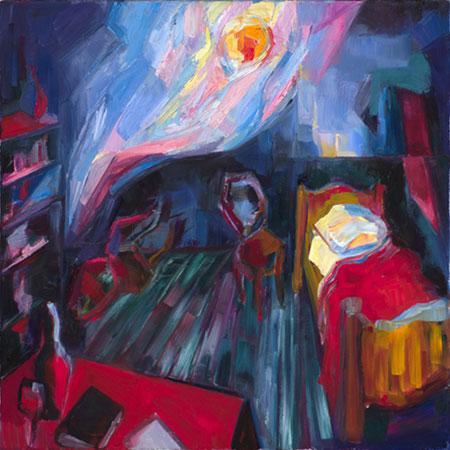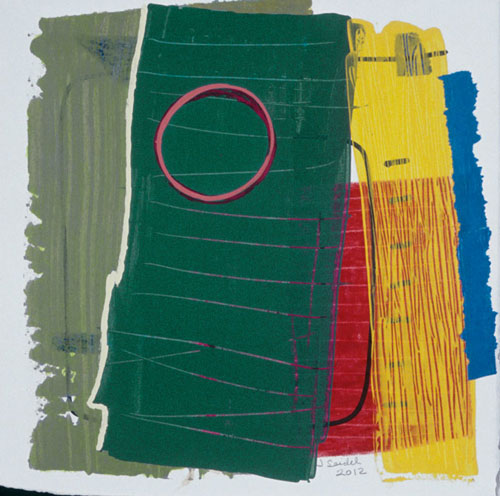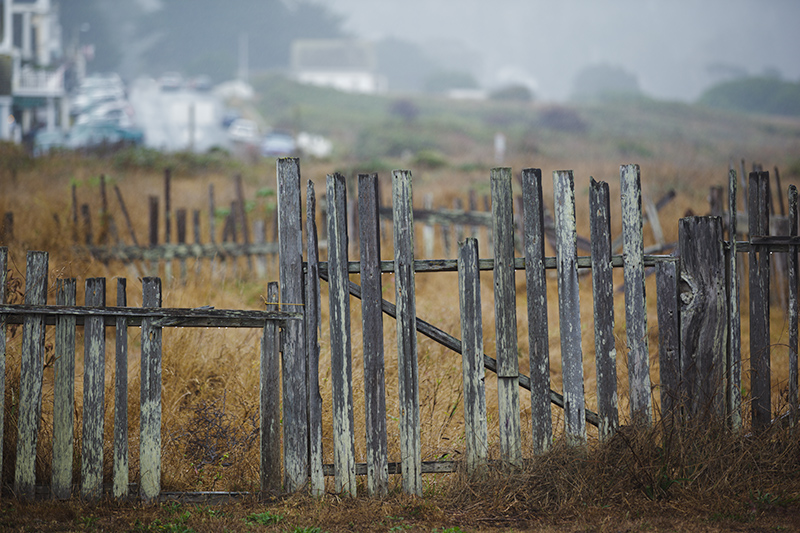Chapter 4: COMINGS AND GOINGS
“I dwell in possibility…” Emily Dickinson
Psychic Poet’s Window
In a sidewalk psychic’s window
I found a makeshift haven
for poets, wandering like me.
I erased into the purple wizard’s curtains
stitched with sparkling circles,
empty moons to hang from my ears
like so many poet’s musings.
There was Art,
dusty stones of jade
to collect for luck and
bottles of jasmine spray
(since it’s only half-full,
do I get it half-price).
The Doors and Grateful Dead
magnets stick like on the old refrigerator
in the apartment of my childhood
in front of the box set T.V. ancient as
my too old soul.
Blue topaz, red topaz earrings, for sale,
then the explosions of sunflowers painted
to fill every space like the rusty fishes and red tassels,
metallic and hanging like gypsy chandeliers
from the black box ceiling.
Art filled and
spilled over
knocked over
bottles of paint,
then me.
Stephanie Laterza

Lena Levin, Sonnet 29: When in disgrace with fortune and men's eyes, Oil on linen
San Leandro Michaels
~For Bev, in memoriam
In the far back,
where sunlight doesn’t reach
sits a dirty plywood counter.
It signals entrance to a realm
where only the framers go.
On that dirty counter sits a bell. I rang it once
just to make the framers sweat.
They thought I was a customer
ready to call them incompetent
like some woman did months ago.
Beyond that old counter surrounded by frames
flanked by worn samples
waits a cluttered room where the tools of the framer rest,
screwdrivers, wooden frames and sheets
of glass that echo the question:
When will the old woman with the gimp leg return?
Never, I think and reach out,
the sharp chime breaking open silence
and taking hope with it. I step back and
Get to work, someone says.
And I do. I turn away and face
aisles upon aisles of merchandise.
Colors blend until everything becomes a wave
of chattering customers and squeaking carts.
The fluorescent light and noise are staggering.
How many years will I spend here?
Mary Sanchez
My Dad's Job
I remember when we drove my Dad to the Hawley Plant in West Allis where he worked in the 1950's. Just in from the road, such a huge, busy place, men and machines, I can see it like it was a movie.
After he died in 2008 I drove over there, but it was all blocked off, I couldn't get near it. I photographed what was left of the vacant buildings, sun-baked in the summer afternoon, overgrown. I had always had a sense that he hated his job there, but in retrospect I don't think that was true at all.
Cleaning out his closet later we found the certificate from the Department of War. When I was young, whenever I asked about his job, he would only say that he was an "electrical engineer". He wouldn't talk about it, he couldn't talk about it, he had worked on the Manhattan Project.
Jane Rades
Boxes
People lived in boxes then
girls played with dolls and wore pink ruffles
in their girly curly boxes of sweet things
little boys made model airplanes and built with metal
erector sets for their toy cars to rrummm around in the house
Mommy in her kitchen box prepared the meals while Daddy
smoked in his den before the family room became fashionable
There were plain pine boxes for darkies and white boxes
with pillars for palefaces
red boxes in the country smelling of animals
quiet little yellow boxes in the bedroom communities
The cripples and the crazies were invisible inside doors
the large old folks boxes kept getting bigger and bigger but
the biggest boxes were for people who spoke different languages
There were barbed wire fences and high concrete
walls to keep everyone in their places
All this was before the boxes fell apart
Young people climbed out and
fell in love with each other.
Claudia Chapline

Judy Seidel, Working It Out #6, Mixed Media on Paper
"how to live"
the lemongrass slept with water
in a glass jar last night.
when mamagran greeted the earth in the afternoon
she slit her soil with a knife in a sacrifice
thanking her for her body.
the roots were buried
to stand strong to salute the sky
patted down gently with dirt
like a mother and her baby child
to help ease her into knowing
something precious was coming.
Kimberly Lieu
Connecting Waters
After the Tsunami in Sendai, Japan on March 11, 2011
THERE
where once a city hummed
at the edge of the land
a tsunami of glowing bodies
where once a market
confused survivors wander
lost where once was home
broken under mudded layers
of grief snowed over - silence
where hearts once sang
HERE
In Marin
the steaming mountain's silver necklace
embraces cougar, coon, fox and finch
the Miwok said the mountain was smoking
a sacred message bringer
steaming silver Mount Tamalpais watershed
rivulets running down her face
the Sleeping Maiden's mud mask falling off
her cheeks shedding brush and hairy trees
rocks sliding down her broken nose
her mouths kissing the sand
Eastcoot Creek tasting salt
tide reaching for her tears
a maternal embrace of home coming
as I walk in this shimmering rain
I too shed water
a single letter the difference between here and there.
Claudia Chapline
Louisiana, home of a thousand Family Dollar stores
and cotton farms planted with corn for ethanol
I think of you as I return to Oakland,
report for jury duty with hundreds
of others wating to be screened for weapons,
swiping smart phones as if they could save us.
Louisiana, camouflaged in brown leaves
on a breast pocket of lottery tickets and cigarettes.
Another weekend I drive across the Bay Bridge,
pass a coral reef that covers the hills of San Francisco
in window panes of white waves,
I'm lost in a place between two places
where fresh produce arrives from Walmart
and everyone is a po'boy at the gas station.
Louisiana, my hand shimmers in your bayou,
in the Ouachita River where grandmothers
tell stories from mounds of earth,
a bay and a cypress
and the word hosanna,
how they grew apart in a well of water.
Louisiana, we live in two places.
Lenore Weiss

Philip Lewenthal, Divided, Photograph
Refugee
Sits on the porch swing under the blue mosquito-
repellant fixture, in the daze darkness nightly
ropes her into, when her inborn eagerness
dwindles and she can’t believe in the word if.
Only the way the cat perks its ears as though
wind, dishevelling leaves, might be a mouthful.
The cat hoards instinct; all she can do is
braid rope into the memory of crossing
water, her father warning her not to trail
her fingers over the boat’s edge. Up ‘til then
she’d thought water was friendly, the frogs’
teeming taunts, flash of silver fish that fed them.
Up ‘til then, she’d thought darkness a blanket
full of holes and the sun just hiding
behind it. What a prodigious loss
her mother was, is why even now, she
sits out waiting for the blue electricity
Father swears will protect her, to signal
Mother, “Here. Over here is our new home.”
Grace Marie Grafton
ELECTRIFIED
I walk north on Castro Street, dodging puddles, people. Look east down 18th Street. Surprise! After nights of clouds and rain a pale yellow almost full, squishy moon squats above the East Bay hills in an indigo sky waiting to cross the Bay. A Cheshire cat of a moon.
I step into the crosswalk, dodge pedestrians, impatient drivers, belching buses. Rush hour traffic. I rush to meet a friend. We share bits of our lives over bites of food; then step quickly to the Herbst Theatre to see PRACTICE OF THE WILD, a film featuring Gary Snyder -- poet, tale teller, scholar; and his friend, Jim Harrison, another poet, ecologist, writer. For much of the film the two weather-worn tale tellers stroll along the Sierra foothills talking, questioning -- accompanied by an elegant French poodle who looks like she, or he, has just stepped off the plane from Paris. The poets agree that nature does not stop at city limits or the front door – it is all around us, under our feet, above our heads, in us. We breathe with the trees.
Three hours later I walk south on Castro Street to my home. Street still crowded, bars overflow, young men cruising, homeless on the corner ask for spare change. Snyder says the planet is out of balance – too many people, too few animals.
Crisp dark air brushes my face and hands, a brisk embrace. The words of the poets, the fresh night air energize me.
I wait for the WALK signal at the corner of 18th and Castro, look up at telephone poles, street lights, power lines, the cables that power the electric buses, and see a glowing white ball. Another street light? No, it is the same old moon hanging out in the neighborhood, but higher in the sky on the arc of its leisurely westward journey.
Tonight I see the moon for the first time.
Nancy Wakeman
Winter Magic
Clouds roll in through the Golden Gate
covering the blue with ink blot tones
settling doom onto the day.
The birds are quiet – hiding in the trees.
I, too, nestle in my bed
where greyness turns to warm.
Dark thoughts match the charcoal sky
until I think of Mama
fending off bad weather
with her kitchen wands: rolling pin and
cookie cutters, bowls and spoons and pans.
I toss off the weight
of covers and clouds
and don my bright red apron.
The scent of cinnamon and ginger
mingles with the oven’s heat
and overcomes the gloom.
Cherise Wyneken

Susan Black, Horizon, Watercolor

